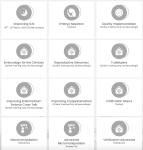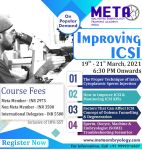
IVF NewsWebinar: THE MITOCHONDRIACS
International IVF Initiative 22 March 2021

Tuesday 23th March, 2021. 3PM EST/ 7PM GMT / 8PM CET Moderators: [ Full Article ] News: Mouse embryos grown outside a uterus for 11 days
Dr George Janes 22 March 2021
Researchers have devised a method for growing mouse embryos up to the point they start growing limbs and organs, outside of the uterus. The work was published in Nature and performed by scientists at the Weizmann Institute of Science in Rehovot, Israel. Embryos collected from pregnant mice were kept alive for up to 11 days, a week longer than previously possible, by culturing them in rotating flasks containing nutrient solution with carefully controlled gas concentration and pressure. Because the embryos reached organogenesis, the process by which the internal organs and specific structures such as limbs are formed, outside of the uterus researchers were able to observe the early development of limbs and organs. 'If you give an embryo the right conditions, its genetic code will function like a pre-set line of dominos, arranged to fall one after the other,' said Professor Jacob Hanna, who led the work. He continued: 'Our aim was to recreate those conditions, and now we can watch, in real time, as each domino hits the next one in line.' Until now, embryologists have needed to remove developing embryos from within the uterus of a mouse in order to gather information about developmental progress. This obstacle means that research can only provide snapshots of development and not the ability to track these processes in real time. Markers were used which detect the expression of specific development related genes to see whether or not the culture method affected the development of the embryos. These developmental markers were found to be identical between the cultured embryos and those extracted from mice at the same developmental stage, showing that the embryos grown outside of the uterus developed just as they would in the uterus. The new method 'opens new doors by making embryos accessible for a detailed study of many aspects of their development,' Professor Magdalena Zernicka-Goetz, a developmental biologist at the University of Cambridge and California Institute of Technology, not involved in the study, told Science. Growing embryos fertilised using IVF rather than collected from pregnant mice, is the next step for researchers. This will allow the earliest stages of development to be studied as well. It is hoped achieving this could provide some insight into developmental diseases and why implantation and early development of the embryo sometimes fails during pregnancy in mammals. It is currently against guidance from the International Society for Stem Cell Research to carry out research on human embryos beyond 14 days. At this stage the embryo 'gastrulates' into layers of cells that go on to differentiate into different parts of the body. Updated guidance on this is expected in May. SOURCES & REFERENCES
[ Full Article ] News: How sperm transfer epigenetic memories to the embryo
David Cansfield 22 March 2021
The mechanism by which environmental factors are transferred from sperm to embryo has been identified. Researchers from Canada's McGill University have discovered how epigenetic changes in sperm can transmit information to the embryo by non-DNA means. These alterations to the gene expression in sperm were caused by dietary changes, researchers found. Previous research has shown that DNA methylation in certain regions of DNA in sperm affected gene expression, and could possibly be used to predict autism in children. This growing study area means that new avenues of disease prevention could be explored, specifically in relation to the transmission of environmental conditions and paternal experience. 'A non-DNA based means by which sperm remember a father's environment (diet) and transmit that information to the embryo... presents a major shift from what is known about heritability and disease from being solely DNA-based, to one that now includes sperm proteins.' said Dr Sarah Kimmins, the senior author on the study published in Development Cell. It is well known DNA passed on by parents is a key determinant of health and disease in their offspring. However, the way those genes are expressed is not as fixed as first thought. The McGill researchers studied this by feeding male mice a folate-deficient diet and following the effects this had on molecules in proteins associated with DNA. The researchers found that the modified diet changed particular molecules called methyl groups. These molecules are associated with histone proteins that play an important role in packaging DNA into cells. It was discovered that these changes were passed on at fertilisation and remained throughout the development of the embryo, resulting in birth defects of the spine and skull. 'No one has been able to track how those heritable environmental signatures are transmitted from the sperm to the embryo before.' Ariane Lismer added, the first author of the paper. Identification of the mechanism that is immediately altered by environmental factors such as diet, lifestyle or the impact of stress to parents may lead to the discovery of new methods for disease prevention. Dr Kimmins' research group is already looking to establish whether 'these harmful changes induced in the sperm proteins (histones) can be repaired' and has stated 'We have exciting new work that suggests that this is indeed the case.' Future research investigating how information is passed from sperm to embryos will continue to shed new light on how the lifestyle of parents prior to conception is equally important for the health of their future offspring. SOURCES & REFERENCES
[ Full Article ] Announcement: ICSI Course
Seema Nair 16 March 2021
News: Hormone 'pulses' that govern fertility are regulated by brain cells
Beatrice Costa 15 March 2021
A specific type of neuron is essential to fertility, Japanese researchers have discovered, suggesting a possible new approach to combat infertility. The cells, called KNDy neurons, which are found in the hypothalamus brain region, were shown to be required in generating the 'pulses' of hormones that drive the reproductive systems of male and female mammals. The mechanism by which these pulses are generated had previously been a mystery. 'Reports suggest that at least 25 percent of ovarian disorders are due to dysfunction of the brain mechanism controlling the release of gonadotropins, a kind of hypothalamic reproductive disorder,' said Professor Hiroko Tsukamura, from Nagoya University, who led the research. Gonadotropin-releasing hormone (GnRH) is a molecule controlled by the hypothalamus that regulates the release of a range of reproductive hormones – such as gonadotropins – into the bloodstream. KNDy neurons are known to secrete several signalling molecules including kisspeptin, a hormone encoded by the Kiss1 gene, that is linked to puberty onset and influences the development of ovaries and testes. Additionally, kisspeptin signalling plays a key role in regulating the healthy release of GnRH (that is, in pulses) and subsequent release of gonadotropin pulses. The study, published in Proceedings of the National Academy of Sciences, used genetically modified female rats to demonstrate that a lack of properly functioning KNDy neurons causes infertility. Researchers deleted the Kiss1 gene in a female rat to stop kisspeptin production and observed that no GnRH/gonadotropin pulses were produced and that the animal was infertile. On the contrary, when they boosted the number of properly functioning KNDy neurons by inserting the Kiss1 gene, gonadotropin pulses started again. 'KNDy neuron deficient male and female mammals can never be fertile,' said Professor Tsukamura 'Seen in this light, KNDy and then gonadotropin-releasing hormone neurons are indispensable for fertility in both male and female mammals'. The authors suggest that 'rescuing' KNDy neurons using gene therapy could prove effective in restoring fertility. They plan to conduct further studies to translate these findings into humans. SOURCES & REFERENCES
[ Full Article ] Webinar: THERIO!
International IVF Initiative 14 March 2021

Tuesday 16th March, 2021. 3PM EST/ 7PM GMT / 8PM CET [ Full Article ] Announcement: Curtain Raiser 6 - IUI ( Intrauterine Insemination ) PROTOCOLS FOR BEGINNERS
Dr. Prof (Col) Pankaj Talwar VSM 11 March 2021
Announcement: Course Name : Ovulation Induction, IVF, OPU-ET, Reproductive Ultrasound and QA/QC
Dr. Prof (Col) Pankaj Talwar VSM 09 March 2021
Announcement: META Courses
Dr. Keshav malhotra 08 March 2021

META offers various online and Hands on courses for improving your technical knowledge and skills in embryology. Our Website has the full details of all the course that are available at your disposal. Hands on Biopsy alslo open for April
[ Full Article ] Announcement: ONLINE MODULE
Dr. Keshav Malhotra 08 March 2021

Improving ICSI 19th - 21st March, 2021 6:30 PM Onwards Course Description ICSI is a critical step in the ART cycle, a proper technique will ensure good fertilisation thus resulting in better outcomes. This course will cover the intricacies of ICSI, and steps that can ensure the best kind of fertilisation in your lab. We will also touch upon troubleshooting scenarios and how to tackle them in the lab. Course Curriculum
Scientific Highlights
Course Fee META Member - INR 2975 [ Full Article ] |